- Joined
- Oct 9, 2007
- Messages
- 47,670 (7.43/day)
- Location
- Dublin, Ireland
| System Name | RBMK-1000 |
|---|---|
| Processor | AMD Ryzen 7 5700G |
| Motherboard | Gigabyte B550 AORUS Elite V2 |
| Cooling | DeepCool Gammax L240 V2 |
| Memory | 2x 16GB DDR4-3200 |
| Video Card(s) | Galax RTX 4070 Ti EX |
| Storage | Samsung 990 1TB |
| Display(s) | BenQ 1440p 60 Hz 27-inch |
| Case | Corsair Carbide 100R |
| Audio Device(s) | ASUS SupremeFX S1220A |
| Power Supply | Cooler Master MWE Gold 650W |
| Mouse | ASUS ROG Strix Impact |
| Keyboard | Gamdias Hermes E2 |
| Software | Windows 11 Pro |
CORSAIR, a world leader in high-performance gaming peripherals and enthusiast components, today announced the launch of the new CORSAIR MP400 Gen3 PCIe x4 NVMe M.2 Solid State Drive, taking advantage of 3D QLC NAND technology to store massive amounts of data with lightning-fast transfer speeds of up to 3,400 MB/sec sequential read and 3,000 MB/sec sequential write. The MP400 is available now in 1 TB, 2 TB, or 4 TB capacities, with an 8 TB model coming soon.
Conveniently slotting directly into a motherboard thanks to its M.2 2280 industry-standard NVMe form-factor, the MP400 boasts wide-ranging compatibility and high-bandwidth performance, while its high-density 3D QLC NAND memory ensures better value than previous generation TLC NAND, able to store more data in the same amount of physical space.
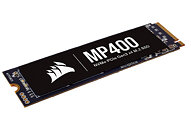
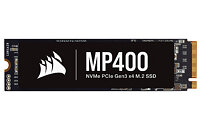
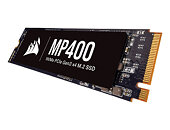
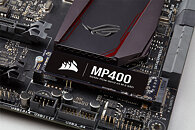
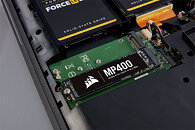
Like all CORSAIR solid state drives, the MP400 combines with free CORSAIR SSD Toolbox software, enabling convenient features such as secure erase and firmware updates right from the desktop. With endurance up to 1,600 TB Written and a five-year warranty for guaranteed peace of mind, the CORSAIR MP400 makes incredible M.2 performance and massive capacities available to more PC builds than ever before.
The CORSAIR MP400 M.2 NVMe SSD is available immediately from the CORSAIR webstore and the CORSAIR worldwide network of authorized retailers and distributors.
The MP400 is backed by a five-year warranty, alongside the CORSAIR worldwide customer service and technical support network.
View at TechPowerUp Main Site
Conveniently slotting directly into a motherboard thanks to its M.2 2280 industry-standard NVMe form-factor, the MP400 boasts wide-ranging compatibility and high-bandwidth performance, while its high-density 3D QLC NAND memory ensures better value than previous generation TLC NAND, able to store more data in the same amount of physical space.





Like all CORSAIR solid state drives, the MP400 combines with free CORSAIR SSD Toolbox software, enabling convenient features such as secure erase and firmware updates right from the desktop. With endurance up to 1,600 TB Written and a five-year warranty for guaranteed peace of mind, the CORSAIR MP400 makes incredible M.2 performance and massive capacities available to more PC builds than ever before.
The CORSAIR MP400 M.2 NVMe SSD is available immediately from the CORSAIR webstore and the CORSAIR worldwide network of authorized retailers and distributors.
The MP400 is backed by a five-year warranty, alongside the CORSAIR worldwide customer service and technical support network.
View at TechPowerUp Main Site



